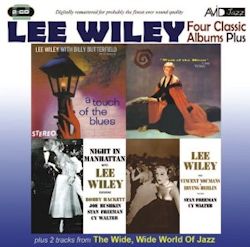CD1
1-12: ‘Night In Manhattan’
1. Manhattan
2. I’ve Got A Crush On You
3. A Ghost Of A Chance
4. Oh! Look At Me Now
5. How Deep Is The Ocean
6. Time On My Hands
7. Street Of Dreams
8. A Woman’s Intuition
9. Sugar
10. Any Time, Any Day, Anywhere
11. Soft Lights And Sweet Music
12. More Than You Know
13-24: ‘Lee Wiley Sings Vincent Youmans & Irving Berlin’
13. Tea For Two
14. Sometimes I’m Happy
15. Rise ‘n’ Shine
16. Should I Be Sweet?
17. Keepin’ Myself For You
18. Why, Oh, Why?
19. Some Sunny Day
20. I Got Lost In His Arms
21. Heat Wave
22. Fools Fall In Love
23. How Many Times
24. Supper Time
25. Stars Fell On Alabama from ‘The Wide, Wide World Of Jazz’
26. Do You Know What It Means To Miss New Orleans from ‘The Wide, Wide World Of Jazz’
CD2
1-12: ‘West Of The Moon’
1. You’re A Sweetheart
2. This Is New
3. You Must Have Been A Beautiful Baby
4. Who Can I Turn To Now?
5. My Ideal
6. Can’t Get Out Of This Mood
7. East Of The Sun (West Of The Moon)
8. I Left My Sugar Standing In The Rain
9. Moonstruck
10. Limehouse Blues
11. As Time Goes By
12. Keepin’ Out Of Mischief Now
13-24: ‘A Touch Of The Blues’
13. The Memphis Blues
14. From The Land Of The Sky Blue Water
15. The Ace In The Hole
16. Someday You’ll Be Sorry
17. My Melancholy Baby
18. A Hundred Years From Today
19. Blues In My Heart
20. Maybe You’ll Be There
21. Between The Devil And The Deep Blue Sea
22. I Don’t Want To Walk Without You
23. Make Believe
24. A Touch Of The Blues
Lee Wiley (vocals) featuring Billy Butterfield, Bobby Hackett, Urbie Green, Lou McGarity, Cutty Cutshall, Peanuts Hucko, Joe Bushkin, Milt Hinton, Don
Lamond, Cliff Leeman and others
Recorded 1950-57
AVID AMSC1113
[2 CDs: 77:55 + 79:04]
There can never be too much Lee Wiley. These four albums come from the 1950s, a period where her voice turned huskier and where the backing she received
varied between solid Condon-derived groups and a more pedestrian, stripped down two-piano supper club affair. Nothing could affect the quality of her
voice, though it’s worth noting the nature of the latter backing at the outset.
Fortunately the first album, ‘Night in Manhattan’, features Bobby Hackett on several tracks, joining Joe Bushkin and his Swinging Strings. Bushkin tends to
dominate (in a good way) so that his Teddy Wilsonesque stylings are heard more often than the strings, swinging or otherwise, which are often placed quite
far back in the balance mix. It’s good to hear the full set of lyrics on Ghost of a Chance rather than just the bare bones affair that Bunny
Berigan sang, and Wiley’s version is wholly independent evoking quite a different mood. The vibrato that now quite noticeably flecks her voice is warm and
expressive. How Deep Is The Ocean is a particularly beautiful example of her art, even though many died-in-the-wool admirers will not much care
for the two-piano team of Stan Freeman and Cy Walter, who back her. They do so again on the whole of the 1951 album ‘Lee Wiley Sings Vincent Youmans &
Irving Berlin’ where she sings Tea for Two (complete) with élan but a lived-in voice, which certainly suits Why, Oh Why? When Wiley’s
sassy nature comes to the fore, as it does in Heatwave, she almost manages to overcome the rather ploddingly metronomic and unvaried piano team
behind her.
We hear the two tracks that feature Wiley from the album ‘The Wide, Wide World Of Jazz’ – the band is similar to the one that supports her on the LP ‘West
Of The Moon’, which has a good tune selection, none of which she had recorded before, and the accompaniment of Ralph Burns and his orchestra. The question
of song selection is interesting, and it makes for exciting listening to hear her in You’re A Sweetheart and My Ideal as well as the
other ten tracks that make up the album. The backing is varied, as there are three different bands behind her, marshalled by Burns. Sometimes we hear
Condonesque Chicagoan – led by Billy Butterfield and trombonist Lou McGarity with Peanuts Hucko playing especially well – and sometimes a different combo
where more modern players like Nick Travis, Bernie Glow and Urbie Green are the front liners. Then there is a wind band – flute, clarinet, oboe etc – with
a small string section, all unnamed, which again spices up the backings. This is a cleverly varied affair. The last of the four albums is ‘A Touch of the
Blues’ recorded in NYC in July 1957. The conceit is in the songs, each of which has Blues in the title. Butterfield is the leader, Al Cohn and Bill Finegan
the arrangers. Fine players litter the ensemble – Cutty Cutshall is one of the two trombonists, and the sax players include Hank d’Amico, Nick Ciazza, and
Toots Mondello as well as Cohn. Milt Hinton is the bass player, Don Lamond the drummer. Arrangements are fine, tempi are excellent, especially when
confidently slow (The Ace in the Hole). Above all we hear Wiley’s text-conscious directness, a personalisation of the lyrics which means – cliché
though it is – that the listener feels she is singing just to him.
The best of these albums is very good indeed and even when the backing is less apposite Wiley usually unshackles herself. Fine remastering and reprinted LP
notes complete a splendidly priced reissue.
Jonathan Woolf
